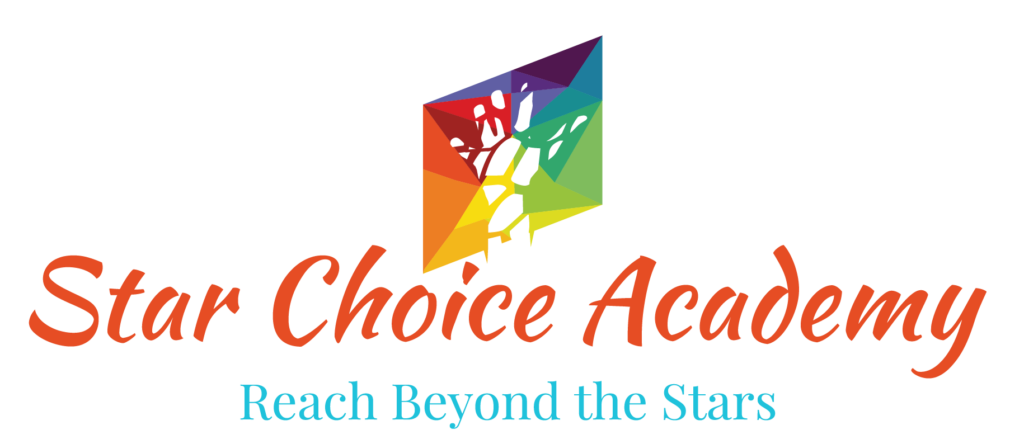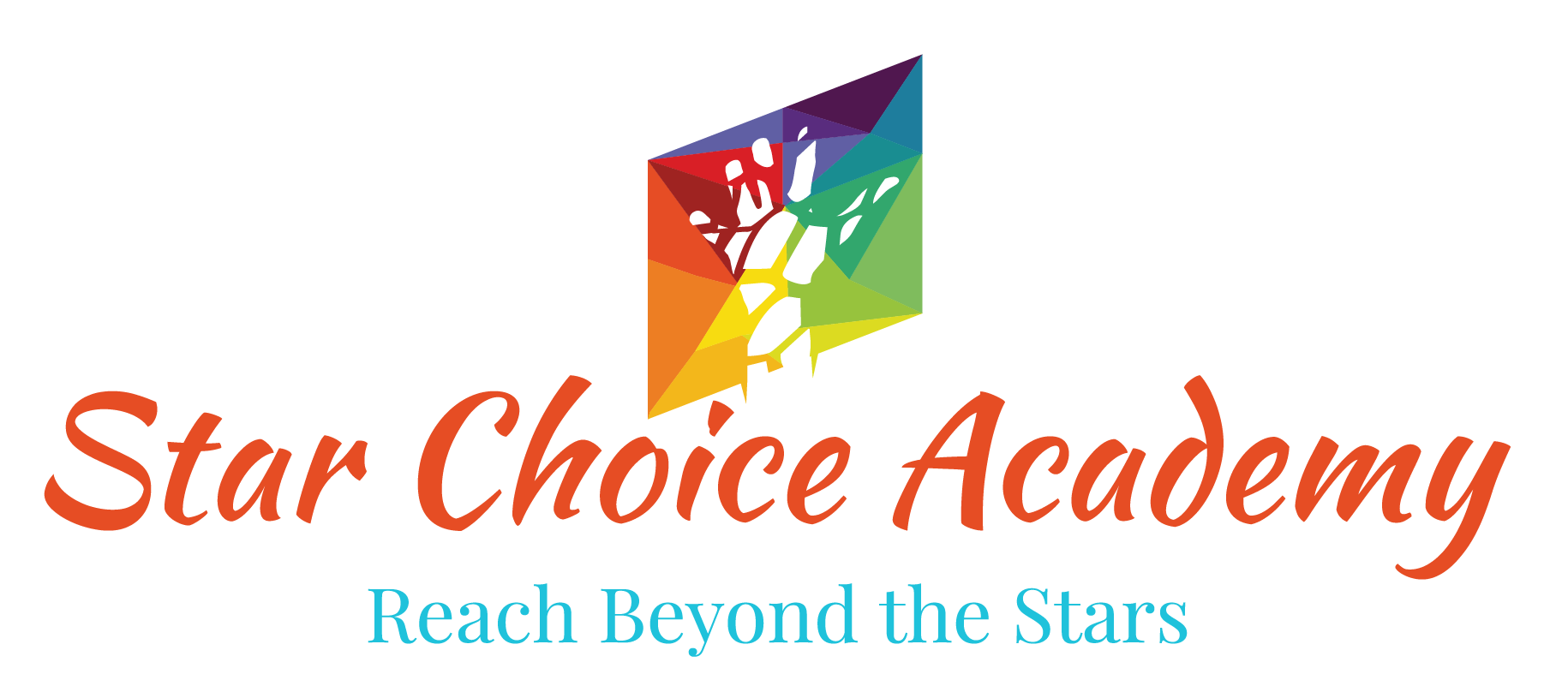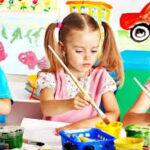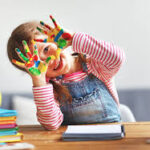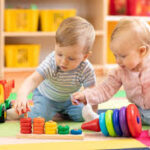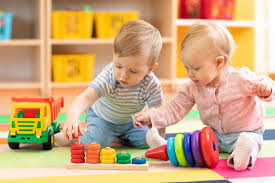

Toddler Room
13 to 24 months
About our Toddler Care
At Star Choice Academy, we help your toddler learn at their own pace by building on their natural curiosity and retaining momentum.
Our teachers develop close, loving bonds with our toddlers as part of our program and care, while leading them through educational activities that encourage their growth and build on the lessons they get at home.
Strict health and safety regulations will be observed.
You can relax knowing that your toddler is in a safe and healthy environment while they’re at our Academy. Based on CDC recommendations, our improved health and cleaning program is intended to reduce coronavirus transmission.

Cognitive Development
Points to objects when they are named
Identify some body parts on self and in books.
Imitates household activities, i.e.: dressing baby, sweeping floor
May spends a lot of time manipulating and exploring objects, putting in them in mouth, shaking them and banging them.
Calls themself by name, using ‘I’, ‘mine’, ‘I do it myself’

Qualified Care
- Your toddler is not only active and curious, but they are highly emotional as well. They have a budding desire for independence and they will continue to grow and develop and so will their daily needs. We ensure that toddlers are fully engaged and challenged to promote and support their developmental growth and milestones. They are also provided with proper diet, nutrition, sleep, safety and care, so you can be confident that your little one is loved and cared for.

Encourage Toddler’s Learning and Independence
Ask questions and allow them to face new challenges, i.e.: what is the right way to walk down stairs? – (listen, correct and explain the process step by step).
Assist toddlers to experiment with everyday things – science experiments. I.e.: explain and show why and how things float and sink, build a tower and identifying smells.
Build vocabulary language by labeling objects and review the names of the objects until your toddler is able to identify the object by its name and able to say its name when pointing to it.
Explore the outdoors with your toddler, walk and talk about things they notice, let them touch, smell and see things move and change over time and seasons.
Developmental Milestones
Hover over each bubble to see what most newborns do at this age.
Language & Communication
• Able to recognize and say their first name.
• Able to say words (mostly naming words) i.e.: chair, table, cup and spoon.
• Begin using one to two word sentences, i.e.: ”want juice”.
• Imitate another toddler or adult gestures and words..
Social & Emotional
Toddler Activities
• Learn self-awareness and explore the world around them by touch, sight, and sound.
• Develop social gestures through interaction and play with other and peers.
• Develop independence, confidence, and self-control.
Fine and Gross Motos Skills
• Bounce and dance in place when hear music.
• Learn to aim and throw small soft objects and kick balls.
• Feed themselves from a bottle, cup, finger foods and try using fork/spoon.
• Begin to walk, climb and run in a hurried way.
• Scribble with pencil or crayon
How Does Your Toddler Learn?
We engage with your child for cognitive function to flourish. Every interaction is a learning phase for the child as they discover the world around them. Our safe environment helps kids digest and react to information and enhance their mental powers. It also improves reading, learning, understanding, recalling, and concentrating.
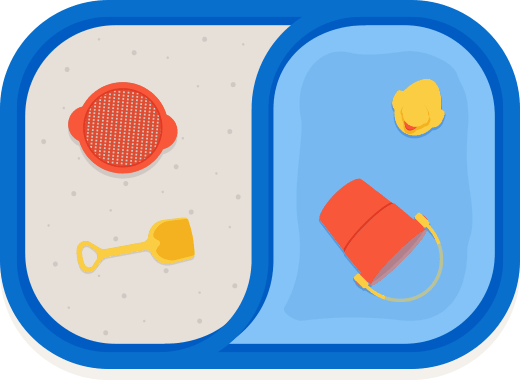
Toddler Activities
- Within the first 24 months, toddlers develop their cognitive abilities as they watch and adapt to the behavior of others around them.
- Our activities include sound recognition, letter and number recognition, and problem-solving. It also includes sorting colors and shapes to help your kid reach key milestones.
- We recommend singing to the child as sounds and melodies help brain growth. It’s a good idea to sing baby rhymes, use pictures to tell stories and get kids to sing along.
Learn On®
Learning continues beyond the classroom. Here are some easy projects you can do to extend learning into your home
- Allow your young child to arrange the building bricks however they choose. It gives them the freedom to dream and be inventive.
- Playing matching games and puzzles with your toddler is an excellent way to help them improve their logical skills.
- Kids can learn comparisons, sizes, and volumes by identifying things by shape, size, and color . They can also learn by following basic directions like in, on, or under.
Focus: Helping your toddler express wants and needs.
Our teachers help transition your toddler from nonverbal to verbal by modeling conversations, teaching sign language and helping them identify familiar people and objects by name.

Toddler Activities
- Imitating the actions of other toddlers and adults through interactive games like “Ring Leader” and “Pretending Parade.”
- Developing pride in accomplishments and showing interest in peers’ actions through supportive activities
- Learning calming and coping skills as they’re encouraged to explain how they’re feeling and ask for help when they’re frustrated.
- Understanding emotions through songs
- Learning how to take turns and play alongside classmates through activities.
- Developing independence by inviting children to answer questions while reading books.
Learn On®
Learning continues beyond the classroom. Here are some easy projects you can do to extend learning into your home.
- Play interactive games like “Ring Leader” and “Pretending Parade” to practice imitating the actions of other players.
- Create a display of your toddler’s artwork to help them develop a sense of pride in their accomplishments.
- Sing “The Look On My Face” while looking in a mirror to develop an understanding of emotions.
- Practice using simple Spanish words, such as “hola,” “adios” and “gracias.”
Helping Toddlers Recognize and Manage their Emotions
We emphasize encouraging your child to appreciate others and comprehend emotions.
We provide a secure and friendly environment so that they can explore their emotion. It also encourages them to join activities where they can express their feelings and form relationships with family, friends, and teachers.

Expressing Emotions Through Play
- Toddlers are little people who frequently lack the language to express their strong feelings. They can discover and express their emotions during play and practice controlling them.
- Toddlers through play learn to self-regulate as they follow social norms, and rules and pay attention while experiencing different feelings, such as anticipation or frustration.
- Play imaginative games with puppets, toys, or old clothes. For instance, your child could act courageously to save toys from a tree or pretend to care for a newborn doll.
- Singing and dancing to emotion-based poems and songs. For instance, “If you’re happy and know it, clap your hands.”
How do Toddlers Learn to Manage Emotions?
- Toddlers understand their feelings through various sources. It includes books, board games, playing with other children, puppets, interactive storytelling or role-play.
- Reading stories that depict people going through emotions your child is also feeling, such as the “When I’m Feeling” series by Trace Moroney.
- Our well-being and also our child’s language development depends on us having positive interactions and conversations with others. For example, active listening, using good manners, speaking clearly, telling the truth, using kind words, etc.
- Practice using simple Spanish words, such as “hola,” “adios” and “gracias.”
